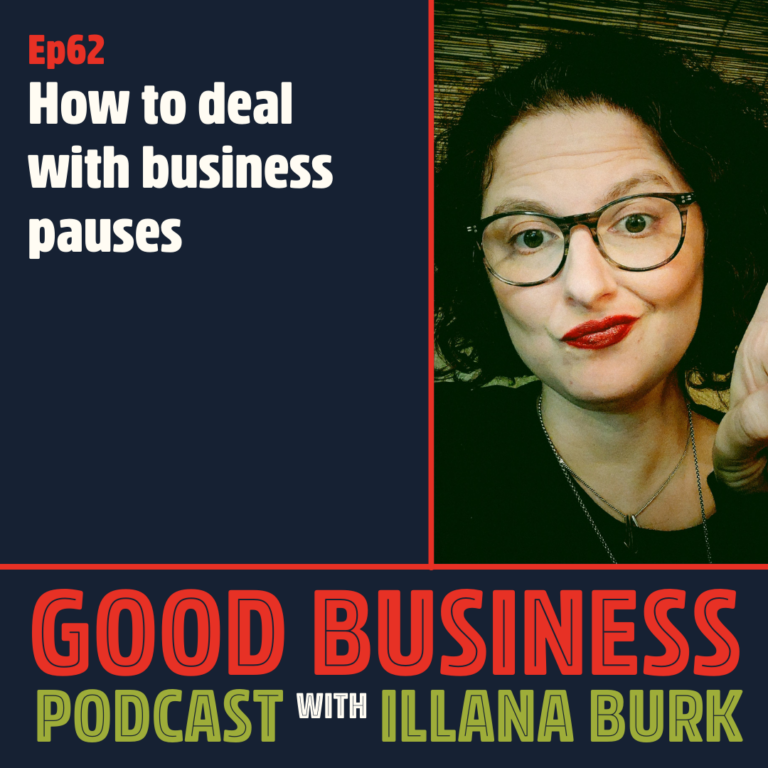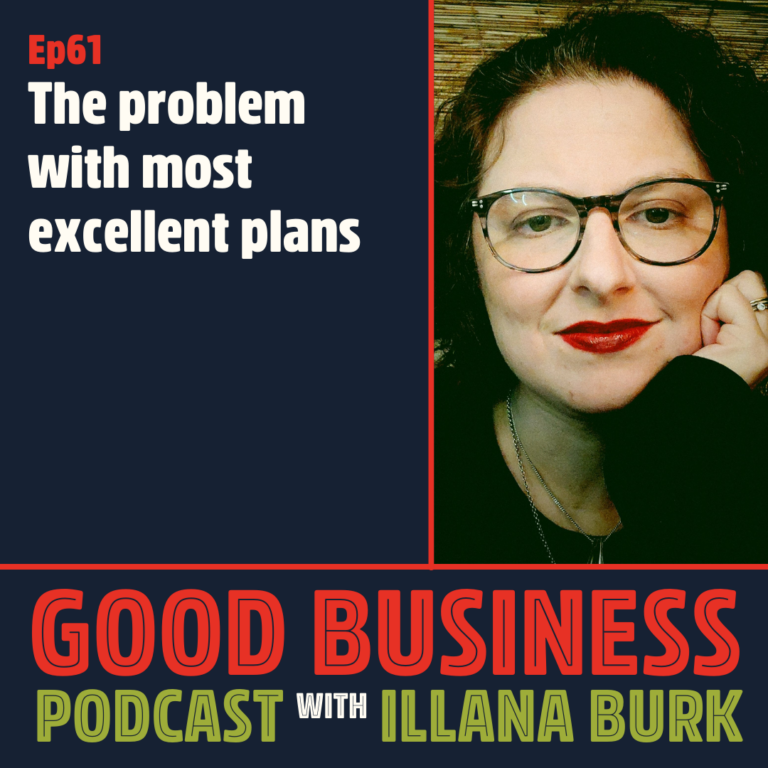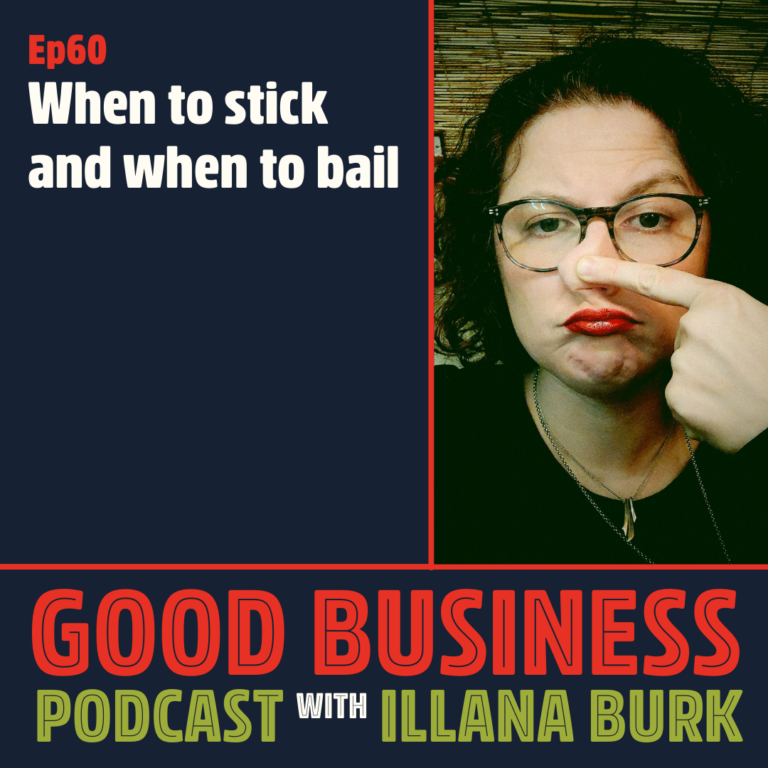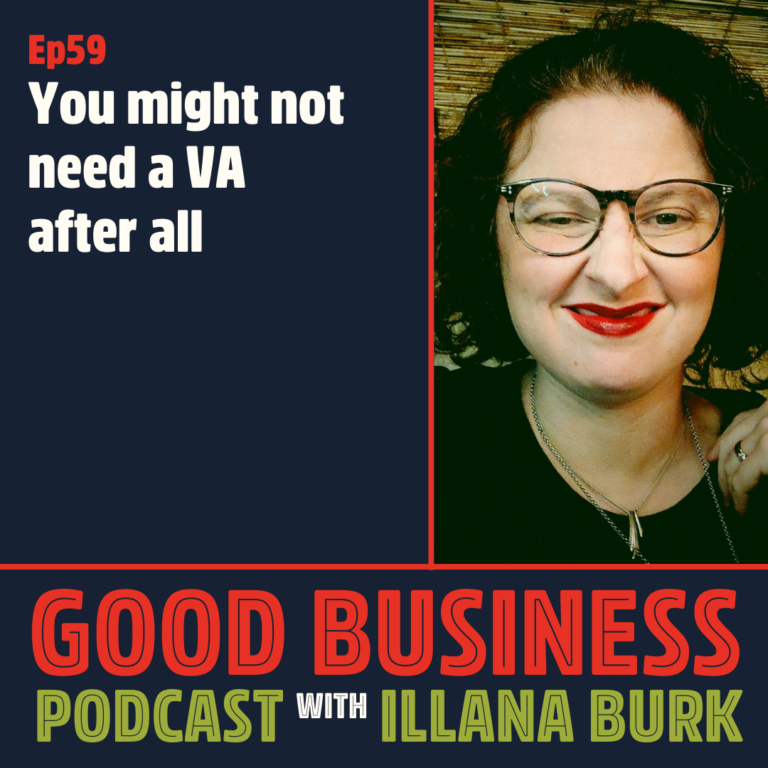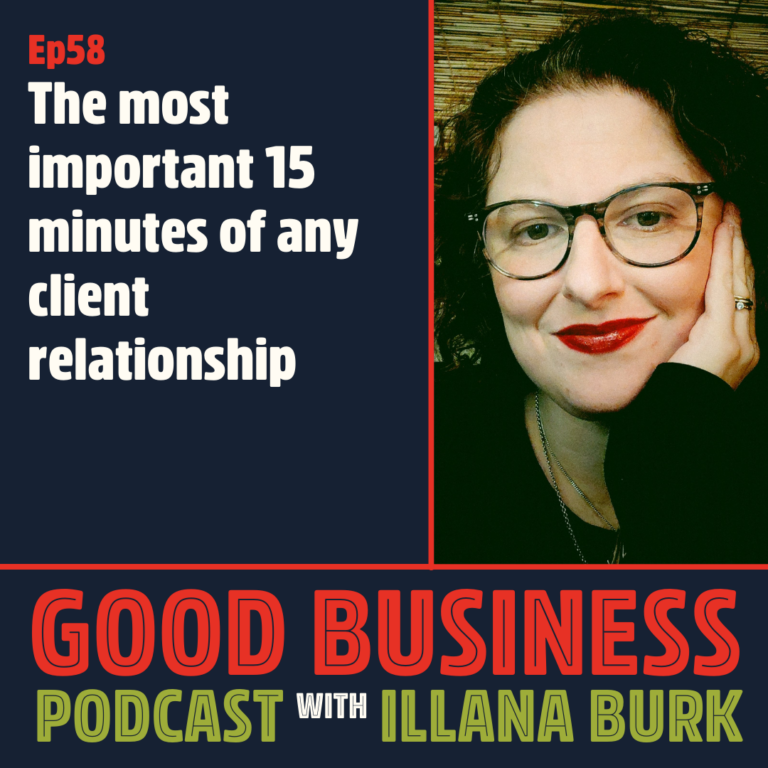What is ethical marketing? What does it mean? What doesn’t it mean? And are you afraid of the wrong thing?
Lately, there’s been a new flavor to the ethical marketing and selling conversation happening amongst small business owners and marketers around what is ethical, what you’re allowed to do and not allowed to do.
Today I am talking about being afraid of saying the wrong thing and whether or not that’s a bad thing, how to stay connected to your customers, and how you can aspire to not hurt others while still saying what you want to say.
Stop being afraid of the wrong thing.
Episode Transcript:
Welcome back to The Good Business Podcast. I hope you enjoyed our series on offer design that we covered over the last several episodes. Today, I’m gonna shift our tone just a little bit into something that is pretty core to everything that I do. And I think probably many of you have found your way to me because it’s an area of particular interest and inquiry for me.
And the topic today is around ethical marketing. And what that is, what that means, what it doesn’t mean. Ethical selling. This all kind of gets lumped into one big pile. And it’s certainly all the buzz these days.
And if you have followed me on social media or, or read my most recent blog post, you probably have a sense of that this has been very top of mind in my world of late. And it kind of always is, but lately there’s been this sort of new flavor to the ethical marketing and selling conversation that’s happening amongst small business owners and marketers and, you know, online business people and offline, I’m sure around what is ethical, right?
And what are you allowed to do and not allowed to do. And we have a whole new cadre of people that are banging the ethics drum. And they’re doing it in all different ways. There’s some that are doing it in really well aligned ways. And there’s some that are using the very same tactics they’re railing against to rail against them, which is kind of the neighborhood that I wanna focus on today.
I had, a colleague of mine, we were joking about this this morning, that somehow people tend to pay attention the most to me and what I have to say when I’m calling someone on something, or when I am pointing at something and going, Hey, look at that, pay more attention to it in this way, because you’re missing something here. And, and somebody should be held somewhat accountable for something, right.
Or maybe just trying to point out that there’s another way of looking at something. And people really like it when I do that. So I was joking about how, I guess I should just make, my entire marketing and, and content plan be about yelling at people, which of course is something that I’ve been kind of nudged to do many times over the years.
And I’ve always rejected. Because it’s not the point. I don’t really wanna be online business’s like shock jockey, like getting on the microphone and just railing at people all the time. Though, there’s plenty to rail against. It’s more like I wait, you know. Her point to me was that I’m very good at waiting until I really have something to say. That’s like really far beyond the pale. And I tend to do it in a more, objective and eloquent way than some. Her words, not mine. But I thought that was a kind of apt way of illuminating why I continue to do things like pointing out when someone is using something that’s really important as a carrot or a stick.
And this particular week, has been a busy one. I have watched the idea of ethics be diminished down to ‘It’s too hard, so I’m not even gonna bother and you don’t have to either.’ I have seen people who are promoting ethical marketing, being vilified, and, sometimes for good reason. And sometimes not.
I have seen a lot of really ethical people who work very hard to make sure their business doesn’t just not cause harm, but perhaps causes cultural repair in one way or another be very disenfranchised by the way their leaders were dealing with them. And my little world has seen a lot of new people come into it as a result of being the one that’s kind of pointing at things and going, Hey, that’s not quite right now.
There’s kind of mishmash that happens in my observation around what happens to good people when they get very successful.
Now, I’ve been at this for a very long time and one could say, I have reached a certain level of success. Certainly less than some, certainly more than most. What I use as a constraint to my own success is can I continue to operate knowing for sure that I’m not causing unintended harm in my path or in my wake. That’s the constraint to my scalability. As long as I can continue to be in touch with that, then I can continue to grow. That’s my line in the sand. And it’s one that in my opinion, is worthy of paying more attention to, for most of us.
Because there’s this moment that tends to happen in entrepreneurial growth, where you convince yourself that being slightly less in touch with the people that you are serving and selling to is okay, because you can’t please everybody and you won’t be able to connect with every customer and you won’t be able to do, all the things that you used to do, because if you want your, if you wanna have a nice, big, broad impact, you’re gonna piss people off or you’re gonna hurt people along the way.
And that’s just the way it is. And maybe it is. Maybe that is the way it is. Maybe if you wanna have a big, broad impact, and you wanna be able to see that in your immediacy, in your immediate future, then you probably will hurt people along the way.
But I wanna challenge all of you to think a little bit differently about your impact. To illuminate this point, I want you to think about, some of your favorite artists, the artists of, the bygone eras, the Van Goghs, the Emily Dickinson’s, the the brilliant painters of that we look at and point at that never had successes in their own. They never knew what an impact they carried while they were alive.
They just continued to create, and they did what they did because it was important to them and they saw beauty in the world. And they saw a way in which they could add to that beauty in the world. Now I’m not saying that you can’t have success in your own lifetime, that you need to just toil away in hellish mental decline while the world just keeps turning, and then someday someone will appreciate you. That’s not the point. That’s some really extreme version of what I’m saying.
But more to the point, you might not always have the privilege of knowing the impact that you have. Just because you don’t create something that has big fat numbers attached to it doesn’t mean that it doesn’t have a butterfly effect on the world around you.
Me. I have worked mostly one on one throughout my career. I’ve run small groups at different stages, but for the most part, there’s been no hundreds of thousands of people paying attention to me all at once. There’s been no I ran a program where there was several hundred people in it and I didn’t get to know everyone’s name.
That’s never happened. And with intention. And as a result of that, I have had some brief moments in my career where I got to reflect on the impact that I’ve had. And my impact is through the people that I work with far more than the people themselves. I work very hard to connect and offer guidance to people who are trying to take those little bits of change and wisdom that I hope to offer and taking it out to the world and spreading it however they can in how they work, in what they do, and what they offer, and in the choices that they make.
And my hope is that I’ve taught them how to be contemplative, critical objective, and really legitimately generous, whenever they can be. And self-sustaining, and kind, and flawed, and capable of making amends when they make mistakes, capable of changing their mind. And capable of measuring the cost of growth. And making decisions accordingly.
If I’ve done those things for my clients beyond helping them figure out what their life’s work is beyond helping them design good launches or business plans or marketing ideas, underneath all of those things is the how. And that’s all the stuff I just enumerated. And if I’ve taught them how to do that for themselves, it means that that’s how they’re gonna move through the world and how they’re gonna operate.
My impact isn’t something I always get to see. oftentimes I don’t even get to see whether or not people took my advice. I don’t often get people circling back and being able to draw direct lines to what I taught them and how it impacted them and how they took it out and helped that grow out into the world as like little seeds.
But I can see it. I can see how they operated before they worked with me. And then sometimes I fast forward years ahead and I can see how they operate as a result of it. Sometimes, maybe from the outside, looking in, in ways that they can’t even see in themselves. I don’t get thank-yous for it. I don’t get the heroic accolades.
I don’t get the splashy testimonials from fancy, expensive other people. But what I do get is a view of real impact on this world. And I get to see. By holding the line on what matters to me and choosing clients who are making choices themselves to take their work out into the world, in some, sometimes small, sometimes large ways,
I know that my work carries outward and that’s what scalability means to me. Because from an ethical standpoint, I can only control my relationship with the person in front of. I can’t control what they do with it, but I can be extremely present and mindful with making sure that the person who’s sitting in front of me is getting my absolute best every single time we talk.
That’s my ethical constraint. When I go too far outside of that, I can no longer promise that to myself or to the people in the room with me. Now, I’m not saying that that’s true for. I’m not saying that that’s the right constraint for everyone. But when scalability and making huge amounts of money is the only thing that you’re focused on and the only thing you’re considering, then you start rationalizing.
And that was what happened this week. I watched several different people write posts that went out to the big wide internet rationalizing not caring about people in one way or another. Rationalizing using tactics that hurt people without a care for it. Without recognizing that that harm has a cost. And that your work will not proliferate the same way if you aren’t focused on that cost. You might sell less by not having countdown timers, by not having emotional triggers that you just pound on and pound on and pound on and pound on until people would buy anything from you.
You might not do as well. That should be something you aspire to, not something you beat yourself up about. We have an opportunity to change how commerce functions in this world. We, the little itty bitty baby few here that the big wide startup world barely even blinks an eye at. They don’t even hardly know we’re here.
We have an opportunity to decide how much we wanna grow, how we wanna grow, how we wanna operate with one another. How we wanna treat one another. You don’t have to do it the way the person in front of us did it. If you see somebody who’s going Follow my lead, you deserve to be a millionaire. Yeah, but do you, what is deserving about that?
Why, why would you want that? Why is that a, why is money the marker? I am not saying don’t make money. I make great money. I make solid funds to fund my life. I make enough money to be happy, to save for my family’s future to sustain life in a world where money is power. That’s the truth. There frankly is not enough money to go around for everyone to make a pile of it.
It sucks, but that’s the unfortunate truth. Until we rebalance wealth in this world, that’s not gonna stop being true. It doesn’t mean that you have some inherent intrinsic thing within you that means that you get to make more money than everybody else because you deserve it. And somehow not believing
that means that you lack self. That’s a fucked up lie. And one that I won’t buy into. No matter how much you want your business to be successful, you need to stop and ask yourself, what does success actually mean? Not just for you, but for other people. If you have a huge rescission rate, when you sell a program, if you sell a, if you have million-dollar launch, but 30% of those people cancel or ask for their money back. That means that hundreds, maybe thousands of people think that what you did was crap or they thought it was harmful in some way. You are causing them harm by making them go through that, by promising something that you can’t keep for everyone because you use manipulative language to get them in the door.
If you have a very high rescission rate, anything over about 5%, you’re doing something fucking wrong. Have a better program and sell it honestly. Sell less. Keep more
It’s infuriating to me to watch the very powerful, meaning the people who have lots of money to throw at things like ads and slick photography, high price copywriters, who make it look like because they’re banging the ethical drum and saying, it’s all about ethics. It’s all about ethics. And then they’re selling you things, using all of the exact same manipulation tactics that everybody else uses, and then they’re telling you that those things are okay.
It’s not fucking okay. It’s really, really not okay. If you feel like your arm is being twisted at the end of a sales page, don’t buy it. If a pain point that felt like a paper cut at the top of the page. And after you’ve read all 2000 words of it, it feels like a gaping gashing wound that you must throw money at to sow up. That means that person has manipulated you. don’t buy And certainly don’t follow their lead just because it works doesn’t mean you should keep doing it.
Things like creating pay upfront discounts for people, unless you have a real present need that you need to make a lot of money upfront, and it’s not gonna cost you your ability to deliver on your promises later, you shouldn’t be offering discounts to people upfront because frankly it is a poor tax.
One of many tactic. You’re telling people who don’t have a big pile of money that they have to now pay extra for the privilege of not having a big pile of money. It’s ridiculous. It’s the Internet’s version of a check cashing scheme. You’re penalizing people who don’t have a bunch of money up front.
Don’t do it. I don’t care if it works better. I don’t care if it stimulates growth. There’s a lot of ways to stimulate growth. That are harder. They take more work, they take more attention. They require you to connect more deeply. They require you to come down off of a pedestal and shake hands and look people in the eye and say, Hey, what can I do for you to make this more accessible?
Doesn’t mean you have to have cheap prices. It doesn’t mean you have to please everybody. It means that you have to actively work at not hurting people. And when someone says, ouch, fucking do something about it.
Ethics They are not a stick to beat people with. They are not a finger to wag at others and they are not a static right and wrong. Every single thing about ethical quandary has nuance and curiosity and a requirement of conversation and discussion. It is not just one thing ever. Just because I get loud and mouthy and opinionated about countdown timers and all these little tactics doesn’t actually mean that I’m right either. It means that you should contemplate this stuff though. Ethical marketers should. Unethical marketers should. Maybe we all just get a little bit more critical. That’s the point here. That context is everything. What is ethical in one context is, can be unethical in another.
So the only thing that I can find that is my guiding light when it comes to knowing what to believe and what not to believe, is are you hurting someone?
And if you find out that you are, what are you doing about it?
And is it really harm or is it bluster? There is a difference. I’ve certainly had people say, Hey, you’re not doing enough about speaking up about this particular thing or that particular thing. That’s not necessarily automatically me causing harm and I’ve chosen not to necessarily do something about it.
But when someone says it really hurts me that you’re not speaking up because your voice is valuable and people listen, that’s a different thing. Telling somebody that they should pay attention and they should use their pedestal for X, Y, and Z is not, that’s not the full story either. But when someone says, Hey, you gotta do better at this because you’re hurting people. You should listen.
Now I’m gonna close this with a bit about fear. In all of the conversations that I’ve had over the last week around these topics, one thing came up, a lot of us are really afraid of saying the wrong thing these days, right? Oh, you just can’t say anything these days, you’re gonna offend someone, everybody’s so woke and it’s so hard.
And I just don’t know, I can’t do this and I can’t do that. And it’s, there’s a lot of this, fragile shit going on where people are just like, I, you know, I don’t know what to say, so I can’t say anything at all. Well, actually that’s not true. You can work your ever-loving ass off at saying the right things.
It is possible. It is possible and you won’t get it right. And you might get canceled and you might have somebody say, Hey, you fucked up. That’s not actually the worst thing that can happen to a person. And they might be right.
Here’s the thing. Most people who are buzzing about this, I just can’t say anything. I’m afraid to say the wrong thing. I really wanna help. And I wanna do good things, but I can’t, I just can’t say anything. And so I, eh, right. And I’m gonna just, so I’ll just talk about tactics and I’ll just stay away from having any opinions on anything…
You’re afraid of the wrong thing. Instead of being afraid of saying the wrong thing, try being afraid of hurting people. If you’re afraid of hurting people, at least you’re focused on the right thing, which will help you say the right thing. It’ll help you invite conversation instead of inviting. Am I right? Or am I wrong? Inviting the stick? Say I am really working hard to not hurt people here. And I have some opinions on things and I welcome conversation. I welcome dissent. I welcome discussion. Please try to make it respectful. And I open the floor.
And then take responsibility for that moment. Participate in it. Don’t hide from it. That’s how you aspire to not hurt others while still saying what you wanna say. So instead of being afraid of saying the wrong thing, be afraid of saying the wrong thing. Find a way to say the right thing. Work at it.
You have to start being more afraid of hurting other people and less afraid of the consequences for ourselves. Being self-centered in that way is what has gotten all of us here to this divided, divisive conversation that is seeped in every single one of our conversations, frankly, every topic, every cause. The only way we ever find our way back to center is if we start caring, what other people feel.
So can we try to do that? Please? Can I ask all of you to think about the ways in which you can do that? I hope so. I hope that’s what I can use my voice for in this world.
And I hope you enjoyed this conversation. And I hope that you will reach out to me and participate in it in whatever ways you would like to.
We’ll be posting this on Instagram. We’ll be posting on Facebook. I’m very findable and I welcome your input. Thanks, everybody.
More Episodes
How to ask for and take feedback | GB63
Navigating feedback can be daunting. In this episode, we dive into the skills of asking for and receiving feedback with intention and grace. Learn the art of crafting your asks to elicit constructive insights and how to...
How to deal with business pauses | GB62
In the fast-paced world of entrepreneurship, taking a break can often feel like a foreign concept. The constant pressure to grow, scale, and make a bigger impact can make prioritizing personal well-being and life outside of work...
The problem with most excellent plans | GB61
Ever plan an amazing business move but hit a roadblock? This episode tackles the "pothole" of poor planning for solopreneurs. Learn how to "right-size" your strategy based on your resources and set yourself up for sustainable...
When to stick and when to bail | GB60
Feeling stuck in a business project that’s not taking off? This episode’s for you! We explore the often-overlooked skill of quitting and guide you through 4 key questions to help you decide when to persevere or let go. Learn to identify your true motivations, navigate self-doubt, and make choices that align with your goals and well-being. Listen to discover when to stick and when to bail!
You might not need a VA after all | GB59
Overwhelmed business owner? Stop! Hiring a VA might not be the answer. Learn how to ID expert vs. VA tasks & hire the right person for the job (without becoming a “shitty boss”). Listen in and get bonus tips in the show notes!
The most important 15 minutes of any client relationship | GB58
In this episode of the Good Business Podcast, we dive into the critical 15 minutes that can make or break a client relationship. Want to know why these first few minutes are so crucial, what should be included, and how to adjust...
